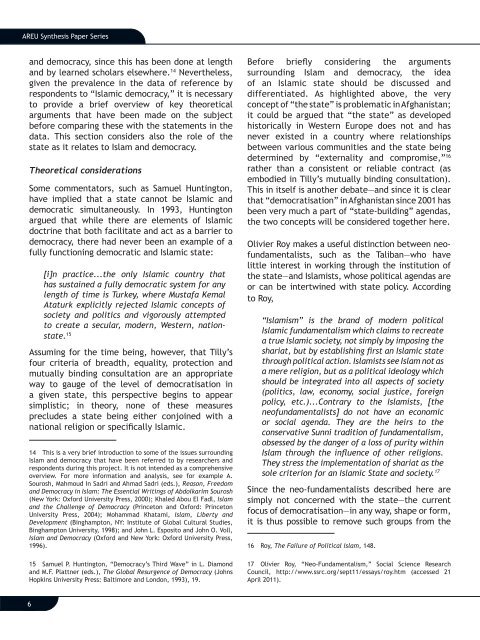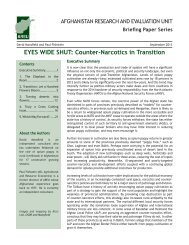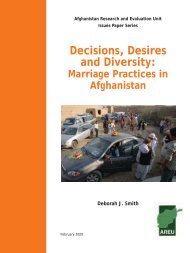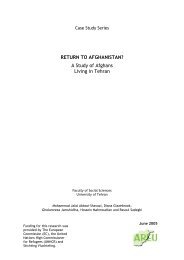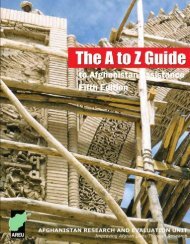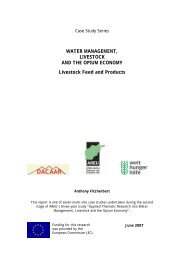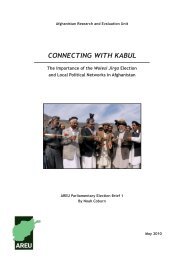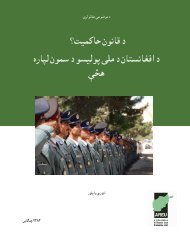“Democracy” in Afghanistan - the Afghanistan Research and ...
“Democracy” in Afghanistan - the Afghanistan Research and ...
“Democracy” in Afghanistan - the Afghanistan Research and ...
You also want an ePaper? Increase the reach of your titles
YUMPU automatically turns print PDFs into web optimized ePapers that Google loves.
AREU Syn<strong>the</strong>sis Paper Series<br />
<strong>and</strong> democracy, s<strong>in</strong>ce this has been done at length<br />
<strong>and</strong> by learned scholars elsewhere. 14 Never<strong>the</strong>less,<br />
given <strong>the</strong> prevalence <strong>in</strong> <strong>the</strong> data of reference by<br />
respondents to “Islamic democracy,” it is necessary<br />
to provide a brief overview of key <strong>the</strong>oretical<br />
arguments that have been made on <strong>the</strong> subject<br />
before compar<strong>in</strong>g <strong>the</strong>se with <strong>the</strong> statements <strong>in</strong> <strong>the</strong><br />
data. This section considers also <strong>the</strong> role of <strong>the</strong><br />
state as it relates to Islam <strong>and</strong> democracy.<br />
Theoretical considerations<br />
Some commentators, such as Samuel Hunt<strong>in</strong>gton,<br />
have implied that a state cannot be Islamic <strong>and</strong><br />
democratic simultaneously. In 1993, Hunt<strong>in</strong>gton<br />
argued that while <strong>the</strong>re are elements of Islamic<br />
doctr<strong>in</strong>e that both facilitate <strong>and</strong> act as a barrier to<br />
democracy, <strong>the</strong>re had never been an example of a<br />
fully function<strong>in</strong>g democratic <strong>and</strong> Islamic state:<br />
[i]n practice...<strong>the</strong> only Islamic country that<br />
has susta<strong>in</strong>ed a fully democratic system for any<br />
length of time is Turkey, where Mustafa Kemal<br />
Ataturk explicitly rejected Islamic concepts of<br />
society <strong>and</strong> politics <strong>and</strong> vigorously attempted<br />
to create a secular, modern, Western, nationstate.<br />
15<br />
Assum<strong>in</strong>g for <strong>the</strong> time be<strong>in</strong>g, however, that Tilly’s<br />
four criteria of breadth, equality, protection <strong>and</strong><br />
mutually b<strong>in</strong>d<strong>in</strong>g consultation are an appropriate<br />
way to gauge of <strong>the</strong> level of democratisation <strong>in</strong><br />
a given state, this perspective beg<strong>in</strong>s to appear<br />
simplistic; <strong>in</strong> <strong>the</strong>ory, none of <strong>the</strong>se measures<br />
precludes a state be<strong>in</strong>g ei<strong>the</strong>r conjo<strong>in</strong>ed with a<br />
national religion or specifically Islamic.<br />
14 This is a very brief <strong>in</strong>troduction to some of <strong>the</strong> issues surround<strong>in</strong>g<br />
Islam <strong>and</strong> democracy that have been referred to by researchers <strong>and</strong><br />
respondents dur<strong>in</strong>g this project. It is not <strong>in</strong>tended as a comprehensive<br />
overview. For more <strong>in</strong>formation <strong>and</strong> analysis, see for example A.<br />
Sourosh, Mahmoud In Sadri <strong>and</strong> Ahmad Sadri (eds.), Reason, Freedom<br />
<strong>and</strong> Democracy <strong>in</strong> Islam: The Essential Writ<strong>in</strong>gs of Abdolkarim Sourosh<br />
(New York: Oxford University Press, 2000); Khaled Abou El Fadl, Islam<br />
<strong>and</strong> <strong>the</strong> Challenge of Democracy (Pr<strong>in</strong>ceton <strong>and</strong> Oxford: Pr<strong>in</strong>ceton<br />
University Press, 2004); Mohammad Khatami, Islam, Liberty <strong>and</strong><br />
Development (B<strong>in</strong>ghampton, NY: Institute of Global Cultural Studies,<br />
B<strong>in</strong>ghampton University, 1998); <strong>and</strong> John L. Esposito <strong>and</strong> John O. Voll,<br />
Islam <strong>and</strong> Democracy (Oxford <strong>and</strong> New York: Oxford University Press,<br />
1996).<br />
15 Samuel P. Hunt<strong>in</strong>gton, “Democracy’s Third Wave” <strong>in</strong> L. Diamond<br />
<strong>and</strong> M.F. Plattner (eds.), The Global Resurgence of Democracy (Johns<br />
Hopk<strong>in</strong>s University Press: Baltimore <strong>and</strong> London, 1993), 19.<br />
Before briefly consider<strong>in</strong>g <strong>the</strong> arguments<br />
surround<strong>in</strong>g Islam <strong>and</strong> democracy, <strong>the</strong> idea<br />
of an Islamic state should be discussed <strong>and</strong><br />
differentiated. As highlighted above, <strong>the</strong> very<br />
concept of “<strong>the</strong> state” is problematic <strong>in</strong> <strong>Afghanistan</strong>;<br />
it could be argued that “<strong>the</strong> state” as developed<br />
historically <strong>in</strong> Western Europe does not <strong>and</strong> has<br />
never existed <strong>in</strong> a country where relationships<br />
between various communities <strong>and</strong> <strong>the</strong> state be<strong>in</strong>g<br />
determ<strong>in</strong>ed by “externality <strong>and</strong> compromise,” 16<br />
ra<strong>the</strong>r than a consistent or reliable contract (as<br />
embodied <strong>in</strong> Tilly’s mutually b<strong>in</strong>d<strong>in</strong>g consultation).<br />
This <strong>in</strong> itself is ano<strong>the</strong>r debate—<strong>and</strong> s<strong>in</strong>ce it is clear<br />
that “democratisation” <strong>in</strong> <strong>Afghanistan</strong> s<strong>in</strong>ce 2001 has<br />
been very much a part of “state-build<strong>in</strong>g” agendas,<br />
<strong>the</strong> two concepts will be considered toge<strong>the</strong>r here.<br />
Olivier Roy makes a useful dist<strong>in</strong>ction between neofundamentalists,<br />
such as <strong>the</strong> Taliban—who have<br />
little <strong>in</strong>terest <strong>in</strong> work<strong>in</strong>g through <strong>the</strong> <strong>in</strong>stitution of<br />
<strong>the</strong> state—<strong>and</strong> Islamists, whose political agendas are<br />
or can be <strong>in</strong>tertw<strong>in</strong>ed with state policy. Accord<strong>in</strong>g<br />
to Roy,<br />
“Islamism” is <strong>the</strong> br<strong>and</strong> of modern political<br />
Islamic fundamentalism which claims to recreate<br />
a true Islamic society, not simply by impos<strong>in</strong>g <strong>the</strong><br />
shariat, but by establish<strong>in</strong>g first an Islamic state<br />
through political action. Islamists see Islam not as<br />
a mere religion, but as a political ideology which<br />
should be <strong>in</strong>tegrated <strong>in</strong>to all aspects of society<br />
(politics, law, economy, social justice, foreign<br />
policy, etc.)...Contrary to <strong>the</strong> Islamists, [<strong>the</strong><br />
neofundamentalists] do not have an economic<br />
or social agenda. They are <strong>the</strong> heirs to <strong>the</strong><br />
conservative Sunni tradition of fundamentalism,<br />
obsessed by <strong>the</strong> danger of a loss of purity with<strong>in</strong><br />
Islam through <strong>the</strong> <strong>in</strong>fluence of o<strong>the</strong>r religions.<br />
They stress <strong>the</strong> implementation of shariat as <strong>the</strong><br />
sole criterion for an Islamic State <strong>and</strong> society. 17<br />
S<strong>in</strong>ce <strong>the</strong> neo-fundamentalists described here are<br />
simply not concerned with <strong>the</strong> state—<strong>the</strong> current<br />
focus of democratisation—<strong>in</strong> any way, shape or form,<br />
it is thus possible to remove such groups from <strong>the</strong><br />
16 Roy, The Failure of Political Islam, 148.<br />
17 Olivier Roy, “Neo-Fundamentalism,” Social Science <strong>Research</strong><br />
Council, http://www.ssrc.org/sept11/essays/roy.htm (accessed 21<br />
April 2011).<br />
6


